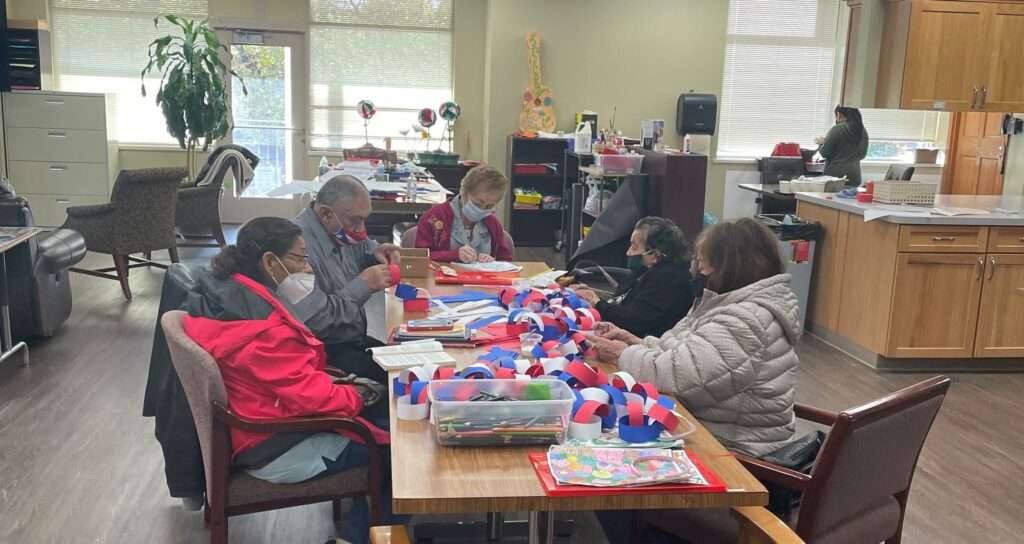Program Helps Spanish Speaking Families With Memory Loss
United Community Center offers caregiver training to families of Alzheimer's, dementia patients.

The United Community Center offers senior services for elders who speak Spanish. Here, participants celebrated Puerto Rican Discovery Day at the Adult Day Center at UCC. Photo provided by United Community Center/NNS.
The United Community Center’s Fortaleciendo Familias program gives Latinx families a chance to care for Spanish-speaking loved ones who have memory loss.
Fortaleciendo Familias, a program from the Latino Geriatric Medical Center Memory Clinic at UCC, offers caregiver training for the family members of people with memory loss, including Alzheimer’s disease and other forms of dementia.
“No matter what, you come to a point where you’re going to need help because taking care of people with memory loss is a lot of work,” Castaneda said.
The program is split into four sessions.
- The first session explains dementia and what happens to someone diagnosed with it.
- The second session explains behavior and Alzheimer’s disease
- The third session covers resources available for people with memory loss and planning ahead on how to use them
- The fourth session is titled “Personal care is not selfish.” It helps those who are taking on caregiving services to advocate for themselves and know how to manage the challenges ahead.
Classes are offered four weeks at a time, with different days and hours during the week to offer the most availability to people.
Castaneda said the most important part of the program was education and preparation. She said helping people learn what programs they qualify for and getting them enrolled was critical, especially as participants try to balance the rest of their daily lives. Some programs can provide financial support and food security options to families.
Castaneda said documentation status can make it difficult for some families to qualify for programs as undocumented immigrants are not eligible for government assistance programs. So it’s important to highlight things they can take advantage of, like UCC’s Adult Day Center, Undocumented people can register for the program.
Castaneda said UCC also offers in-person youth training sessions and a “virtual dementia tour,” which allows potential caregivers to experience what it’s like to have dementia. This can be useful especially for youth who might not know what their relatives are going through.
Teaching family members how to interact with their loved ones who have memory loss is crucial, Castaneda said. If someone with memory loss gets irritated or argumentative, for instance, family members could need some patience.
“It’s no good to say ‘Mom, you told me this five times’—she doesn’t remember,” Castaneda said.
Adriana Gutiérrez, a 39-year-old living on 13th Street and Lapham Boulevard., sought the program out when her mother, Norma Saldivar, 69, was diagnosed with dementia.
“I joined (the program) to help out my mother with her illness, and later on I wanted to learn more about her illness,” Gutiérrez said.
Gutiérrez said the program provided her family with moral support and helped them to understand their emotions after the diagnosis.
“It is a sad thing to see the memory of your loved one leave,” Gutiérrez said.
While Gutiérrez sometimes wondered if what she was learning would be good for her mother, the training ultimately empowered her to help.
“I always noticed that I felt good in that moment and wanted the program to last throughout the day,” Gutiérrez said.
Castaneda encouraged those who have a family member with memory loss to join the program, especially if they plan on caring for them in the home.
“The name says it all,” Castaneda said. “We want to make your family stronger.”
To connect with the program
Call 414-649-2808 or email Vanessa Anciani at vanciani@unitedcc.org.
The program is available to Milwaukee County residents and those living in Racine, Kenosha and Waukesha.
Other resources to know
The Wisconsin Department of Health Services offers a free training video on its website that covers topics such as diagnosis, response to symptoms and care for caregivers.
The Milwaukee County Aging and Disability Resource Center offers dementia care specialists. To contact them, call 414-289-6259 or email dcs@milwaukeecountywi.gov.
NNS Spotlight: How a program from the United Community Center empowers families to care for loved ones with memory loss was originally published by the Milwaukee Neighborhood News Service.





















